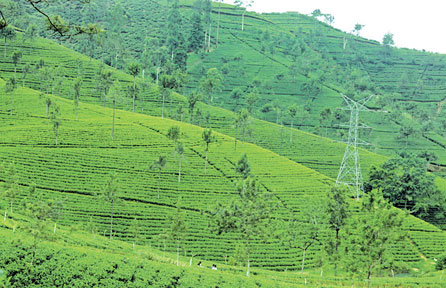Planters say no decision yet on wage hike
The Planters’ Association of Ceylon, the umbrella organisation of
Regional Plantation Companies (RPCs) said no final decision has been
taken on a wage increase for plantation workers as negotiations with
trade unions are continuing.
The Planters’ Association President Sunil Poholiadde said the trade
unions may have agreed to a wage hike but the RPCs have not given their
consent to any wage increase as negotiations are still going on.
 “A final decision could be reached only when all parties agree to a
wage increase formula,” he said. “A final decision could be reached only when all parties agree to a
wage increase formula,” he said.
Planters’ Association Immediate Past President Roshan Rajadurai said
when RPCs incur Rs. 550 to produce a kilo of tea and obtain only around
Rs.429 at the auctions how could the companies increase the daily wage
of a worker to Rs. 730.
Labour Minister W.D.J. Senevirathna said in Parliament recently that
trade unions reached agreement to increase the daily wage of estate
workers from Rs. 620 to 730. Plantation workers have been agitating for
a wage increase for a considerable period owing to the high cost of
living.
However, RPCs have turned down their demand due to the adverse global
market scenario which has brought down the export price of a kilogram of
tea to an average of Rs. 430. Planters’ Association sources said if the
daily wage is increased to Rs. 730 the companies will incur a production
cost of Rs. 600.
“Prices have crashed in the global market. Therefore, we are unable
to pay the increase the workers are expecting. We have proposed a
productivity based formula for wages. Workers could pluck around 25-30
kilos of leaves a day, but they pluck only around 14-16 kilos,” sources
said.
HVA Group and Tea Exporters Association Chairman Rohan Fernando said
although the wage increase is taking place at estate level directly
affecting the plantation industry, as industrialists of the tea export
industry, “we are worried about the cost of production of tea going
beyond any reasonable scale unless wages and the increases thereof are
linked to productivity and efficiency of individual workers.”
“Sri Lanka is pathetically high on labour input in the cost of
producing a kilo of tea and currently hovering around 70% of total
input. In comparison, the rest of the producing countries are managing
labour costs at around 25%, primarily through good plucking output,” he
said.
Fernando said the increase in COP will have to be met with an
increase in auction prices, cost efficient methods at plantation level
and/or through government subsidies.
It is not possible to expect a price increase at the auction to
support the COP as the demand at the auction is dependent on the global
prices for tea. Hence, the only viable option for the tea plantation
industry is to change the cost matrix of the COP to productivity based
output.
- LF
|

